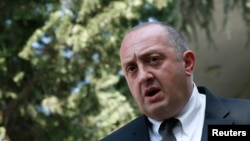The former Soviet republics of Georgia, Moldova and Ukraine are moving inexorably from the orbit of a Russian state that promotes values fundamentally alien to its neighbors, according to Georgia's president.
President Georgy Margvelashvili told Reuters in an interview that Russia, which crushed Georgian forces in a 2008 five-day war, could offer no alternative to integration with the West.
"A country that is alienating its neighbors, that is threatening its neighbors ... What does the country want to achieve?" asked Margvelashvili, who was elected in October 2013, during his first visit to Brussels to meet top NATO and EU officials.
"I don't have a good answer. The country with the biggest territory in the world is looking for a few more square meters," he said of Russia, which annexed the Crimea from Ukraine last year and is accused by the West of fomenting separatist rebellion in the east of that country that has killed 6,100.
Moscow denies that accusation and argues that the West, notably Washington, has stirred anti-Russian feeling in an area, embracing Georgia, Moldova and Ukraine, that it considers its historic sphere of influence.
The Kremlin said it launched its offensive in 2008 to stop a Georgian bid to seize back two pro-Russian Georgian territories that sought to break with Tbilisi.
Russian-Eurasian Union
Russia describes last year's toppling of a pro-Russian president in Ukraine by mass protests and the country's turn away from Moscow toward the EU as a Western-backed coup. Loss of Ukraine was a blow to President Vladimir Putin's plans for a Eurasian Customs Union to parallel the EU.
Margvelashvili said, however, Russia had little to offer, economically or politically.
"There is a much more interesting European market, many more possibilities, but (Russia is asking) why don't you join the Russian market just because Russia wants you to," he said.
"The values that are embedded in the (Russian) political system ... are alien for us. They were alien for us when we were part of the Soviet Union."
Moldova, Georgia and Ukraine signed political and trade agreements with the European Union last year and want to join the bloc. An EU summit in the Latvia capital Riga on May 21-22 with the countries, as well as the more pro-Russian Armenia, Azerbaijan and Belarus, will try to further deepen ties.
The tug-of-war for influence between Brussels and the Kremlin, culminating in the Ukrainian conflict and Western sanctions against Moscow, has raised concern among some in the West about a new Cold War.
Georgia is seeking membership of the Western military alliance NATO and this week began two weeks of military exercises with the United States.
Margvelashvili said he distrusted Russia's offers of security.
"In 1994, Ukraine disarmed its nuclear weapons in a deal signed by Russia, based on goodwill to support Ukraine's territorial integrity. On the 20th anniversary of this historic action, what do we see? We see occupied Ukraine, we see occupied Crimea."
Some Western leaders have cited what they see as a danger Moscow could use Transdniestria, a small pro-Russian separatist entity in Moldova, to create problems for Chisinau.





